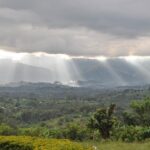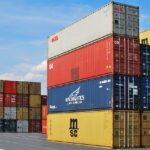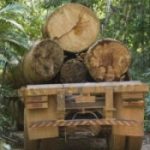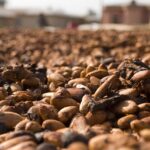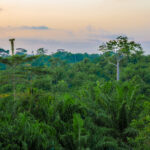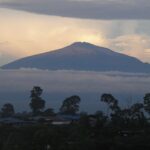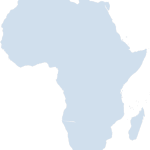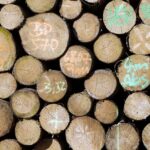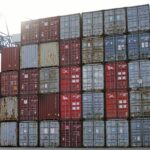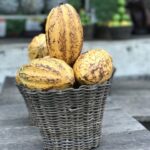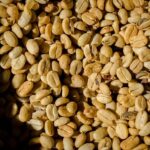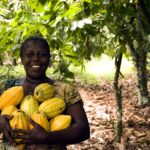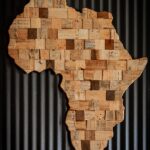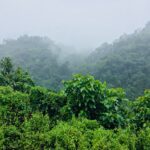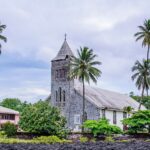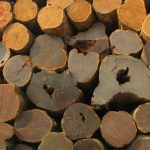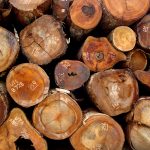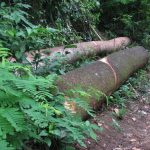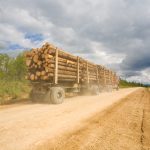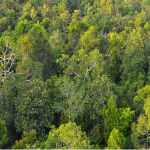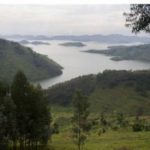
- Illegal logging and forest conversion have been widely reported in Cameroon.
- Wide-ranging illegalities in specific supply chains have recently been exposed, in particular related to the Cameroon-China and Cameroon-Vietnam timber trade flows but concerns remain about illegal timber entering other international markets.
- Significant efforts have gone into increasing transparency but corruption remains a concern.
- Reports continue to document cases of illegal logging particularly around high value species.
- Enforcement remains weak and there is a risk of illegal timber harvested from Cameroon being smuggled across the border and exported from Nigeria.
Read more by downloading the Cameroon Timber Legality Risk Dashboard here.
Global researchers analysed genetic data, stable isotopes and concentrations of multiple trace elements from nearly 250 trees across 13 sites in Cameroon, Gabon and the Republic of the Congo, finding that the three lines of evidence together placed 94 per cent of samples within 100 kilometres of their true origin.
In recent years, the average violation rate has been around four per cent of total inspections.
In 2023, customs carried out around 300 inspections, uncovering 28 violations. The following year saw 600 inspections and 18 violations. In 2025, 584 shipments were checked, with 20 violations detected. A single shipment can contain multiple illegally harvested species. Most of the timber originates from India, the United Arab Emirates and Cameroon. It enters Belgium both as raw logs and processed items. This year, customs seized incense holders, coffee tables, bowls and boxes made wholly or partly from illegal wood, as well as four large carved elephants, each weighing several hundred kilos.
Supported by the French Foreign Affairs Ministry through the local embassies, the two-year project aims to create a robust network of environmental defenders and an observatory to monitor and combat illegal activities harming the region’s rich biodiversity and indigenous communities.
Members of European Parliament submit “questions for answer” to the EC on the EC’s intent to cancel FLEGT VPAs:
Voluntary Partnership Agreements (VPAs) prevent forest loss by implementing legal reform, improving law enforcement and increasing community incomes in several tropical forested countries. The Commission has proposed unilateral termination of the Cameroonian VPA and informed the Liberian Government of its firm intention to terminate the EU-Liberia VPA. It also proposes replacing both VPAs with Forest Partnerships – non-binding frameworks with no role for Parliament and limited public information. The Commission’s actions threaten the EU’s reputation in these countries and risk accelerating forest loss. In Liberia, both the government and civil society have voiced serious concerns about the EU’s approach.
- 1.Why has the Commission chosen to terminate the VPA unilaterally without proper consultation and due process, and why has there been no comprehensive, multi-stakeholder evaluation of the EU-Liberia VPA’s achievements?
- 2.After being stalled by the previous government, implementation of the EU-Liberia VPA has seen progress under the current Boakai administration. Why has the Commission suddenly decided on termination, rather than strengthening the VPA and designing the Forest Partnership to create a mutual reinforcement?
- 3.Given the importance of Parliament, Council and civil society oversight for forests, what role will these groups have in drafting, approving and monitoring Forest Partnerships?
Nature crimes are interconnected with other serious offences like drugs and arms trafficking. Criminal networks exploit the same trade routes, concealment methods, and governance weaknesses, creating a complex web of illicit activities. In fact, nature crimes are now a key financial pillar for other organized crimes.
Over the last four years, TRAFFIC has been working with partners in Brazil, Indonesia, Viet Nam, and Cameroon to understand these overlapping threats and develop strategies to disrupt transnational crime networks while strengthening enforcement.
Starting January 1, 2025, Cameroon has implemented a 20% export reduction on certain shipments of cocoa, rubber, and logs certified as “zero deforestation.” This measure, outlined in a circular signed on December 31, 2024, by Finance Minister Louis Paul Motazé, applies only to products with certificates from the relevant technical ministry confirming compliance with anti-deforestation standards.
In practical terms, 20% of the Free on Board (FOB) value of certified cocoa beans, rubber, and timber is now exempt from export duties. This means exporters will pay duties on just 80% of the product’s value, lowering costs. According to the Ministry of Finance, this measure is designed to combat deforestation by encouraging environmentally friendly practices in cocoa cultivation, rubber production, and forestry.
In August 2024, six Cameroonian cocoa exporters took a further step by signing an agreement to share georeferenced data on cocoa and coffee plantations. Supervised by the Cocoa and Coffee Interprofessional Council (CICC), this platform will provide precise mapping of plantations, helping exporters demonstrate that their products meet European environmental requirements.
Countries in the Central African Economic and Monetary Community (CEMAC) zone continue to endure challenges from low growth, high and persistent poverty, and a strong dependence on volatile oil markets. Well-designed fiscal policies, complemented by increased timber processing, can help build a sustainable timber industry while preserving the vast natural wealth of the Congo Basin.
The World Bank report notes that due to illegal logging, a large informal logging sector, revenue losses from indiscriminate use of tax incentives, and corruption, a significant portion of potential forestry revenue is lost. As a result, revenue from forestry represented a negligible 1% of total tax revenue and 0.2% of GDP in the Congo Basin countries in 2022.
Investigations from InfoCongo, Le Monde, and the Pulitzer Center’s Rainforest Investigations Network show a troubling increase in illegal logging cases in Cameroon.
The investigation found that some of the companies sanctioned by the government for illegal forest exploration still retained their small-scale logging titles, which allows them to continue operating in areas not exceeding 2,500 hectares and have a one-year exploitation period, renewable up to two times.
The report also found that the companies were mining outside of the areas allowed under the small title, further piling on previous violations. This lax government oversight fueled illegal logging and helped facilitate the illicit smuggling of tropical logs to Asia; it also undermined efforts by the Cameroonian government to combat illegal logging in its forest and to protect Indigenous forest communities.
The Rainforest Foundation UK (RFUK) released a report on data it collected on human rights complaints procedures at 24 protected areas in four Congo Basin countries. The data showed that only around a third had active grievance and redress mechanisms (GRMs), and that most suffered from shortcomings related to financing, participation, design and transparency.
Of parks with procedures for community members to make complaints about human rights abuses, fewer than half kept a public register of those complaints or their outcomes.
Almost half of Cameroon is covered by tropical forests, but it is disappearing fast. According to Global Forest Watch, the country lost close to one million hectares of humid primary forest between 2002 and 2023, representing about half of its total tree cover loss in the same period. The devastation is a key focus of several international partnerships with Cameroon, including a European Commission support programme for “development through sustainable and resilient territorial development in the face of climate change” and the EU Voluntary Partnership Agreement on legal timber trade and forest governance.
So far, however, despite being paired with internal laws and regulations, these initiatives have not been effective, as a forest extraction mafia continues to operate with complicity from within Cameroon’s state apparatus.
A ZAM transnational investigation conducted across six African countries has revealed the complicity of governing political elites in rapid deforestation. At the same time, many of these elites are receiving billions of dollars and euros in ‘green’ funds from international partners, including the UN, the EU, and the World Bank. Previous instalments of this investigation, already published by ZAM, have highlighted this pattern in Uganda, Nigeria, and Mozambique. The latest findings from Cameroon, Ghana, and Malawi are in line with the earlier results.
The EU has submitted a proposal for a COUNCIL DECISION on the termination of the Voluntary Partnership Agreement between the European Union and the Republic of Cameroon on forest law enforcement governance and trade in timber and derived products to the Union.
After the recent working session of the Council of Ministers of the Central African Economic Union (UEAC) held on 23 February 2024 in Bangui, Central African Republic (CAR), Cameroon’s Minister for Forestry and Wildlife, Mr. Jules Doret Ndongo, signed a Ministerial Order on 4 April 2024 amending the classification of timber species in Cameroon.
A list of species banned from export in log form is provided. The new classification of species is as follows:
- Species banned from export in log form (76 species);
- Promotional species authorised for export in log form (28 species), 15 species in Category 1 and 13 species in Category 2.
A global shortage of cocoa beans has led to a race among cocoa bean processors to secure high-quality beans, while shunning older varieties. The UK has a large stockpile of lower quality beans from Cameroon, viewed in the industry as of lower quality. Companies had hoped the incoming EU Deforestation Regulation would allow the lower-grade material to be written off as unusable. But the EUDR allows existing stocks to be “grandfathered” — meaning they could still be bought and sold.
Cameroon has hiked up taxes on exported timber – with the country pushing for a total ban on log shipments from 2028. It comes as the BEAC warns that Cameroon, also the central shipping point for the Republic of the Congo and the Central African Republic, is struggling “due to poor road conditions, (and) disruptions in electricity supply,” which in turn is now hindering the industry’s long-term growth.
Last year, Wood Central reported that 4.2 million tonnes of timber products (from 2012 to 2023) were traded into Asia (instead of Europe), with the CEMAC heavily connected to China’s Belt and Road Initiative – now responsible for more than 30% of the global trade in forest products.
Timber exports to the EU from Central Africa have more than halved, falling from $US1.4 billion to $US600 million, according to the Central Africa Forest Observatory, which reports that European supply chains have turned away from Central Africa and instead are targeting South America and South East Asia for semi-finished timber products.
Forestry activities in Cameroon are expected to decline between July and September 2024 due to decreased demand, according to the Central African States Bank (BEAC) economic outlook. The bank’s report also highlights that poor road conditions and disruptions in electricity supply in forested areas are hindering the sector’s development.
This bleak forecast comes amid a progressive increase in export taxes on logs and minimally processed wood in Cameroon. This tax hike has already dampened the activity of some local forestry operators. The government says the higher export taxes are preparing for a ban on log shipments from the CEMAC region and the DRC to international markets. Set to take effect in 2028, the ban aims to boost local processing.
Cameroon’s exports to Europe have been declining, with major importers now based in China and Vietnam.
Operators across the regional have signalled a significant weakening of demand in international markets. Some mills servicing the Chinese market have temporarily ceased operations due to falling Chinese timber imports, others, have pivoted production to species in demand in the EU notably azobe for the Dutch market and timbers such as padouk for Belgium, agba for Portugal and bahia for Italy.
Operators across the regional have signalled a significant weakening of demand in international markets. Some mills servicing the Chinese market have temporarily ceased operations due to falling Chinese timber imports, others, have pivoted production to species in demand in the EU notably azobe for the Dutch market and timbers such as padouk for Belgium, agba for Portugal and bahia for Italy. The overall sentiment is that business remains poor, exacerbated by the European holiday season. Enquiry levels are stable for species such as andoung, iroko, and padouk in Europe. For the Chinese market current demand is focused on high-value timbers such as beli and ovangkol.
Cameroon Mills are focusing on redwood species for Europe. However, it has been reported that arrivals of redwoods from North Congo and RCA at Douala and Kribi Ports have dropped. Millers have observed a rise in regulatory control which has made some mills keeping stocks to a minimum.
Gabon Harvesting remains slow as demand is low for some species. Okoume continues to be in demand for local manufacturing but okoume exports to China have stopped.
A new study has found that all kinds of agriculture can contribute to deforestation to some extent, but the impact from the marginally-higher income gained from cocoa production-based livelihood portfolios was particularly significant, being “associated with six to seven times higher deforestation compared to other livelihood strategies.”
The results suggest that if development leads to households switching their focus from small-scale agriculture to internationally-traded commodities such as cocoa, “this may result in a significant increase in deforestation,” said the authors. Households that consume a lot of what they produce are less likely to deforest the landscape than those that funnel their production towards markets. Yet, “when households have better access to markets, they tend to decrease their share of auto-consumption, which can also have a tendency to increase deforestation.
Study can be found here: Cocoa, livelihoods, and deforestation within the Tridom landscape in the Congo Basin: A spatial analysis – CIFOR-ICRAF Knowledge
A first US$20 million project funded by the Central Africa Forest Initiative (CAFI) will support Cameroon’s small-scale cocoa and coffee producers adapt to the new European Union (EU) regulations, so that they continue exporting to the EU while they transition to deforestation-free agroecological practices based on sustainable principles.
The initiative will be implemented by the UN’s International Fund for Agricultural Development (IFAD) in collaboration with Cameroon’s Coffee and Cocoa Development Fund (‘FODECC’ in French), a unique funding tool created by Cameroon to support small-scale producers in their agro-ecological coffee and cocoa production.
Land grabbing is a major concern for communities in forested zones in Cameroon, where the government granted concessions to create large-scale industrial agriculture projects. Local communities say this deprives them of their traditional way of life, which includes subsistence farming and using the forest for foraging and rituals. As a result, members of 30 communities threatened by agro-industrial expansion, including the Indigenous Bakas of the East Cameroon region, came together to write a list of grievances urging the government to finalize a new land reform.
Using a unique dataset from a survey of 1035 households in the Tridom landscape in the Congo basin, the reports model shows that: (1) Households imitate the deforestation decisions of their neighbors; (2) A marginally higher income from cocoa production-based livelihood portfolios is associated with six to seven times higher deforestation compared to other livelihood strategies with a significant spillover effect on neighboring households’ deforestation. The increase in income, mainly from cocoa production-based livelihoods in open-access systems can have a negative effect on forests. Households with a higher share of auto-consumption are associated with lower deforestation. If economic development brings better market access and lower auto-consumption shares, this is likely to positively influence deforestation. Without proper land use planning/zoning associated with incentives, promoting sustainable agriculture, such as complex cocoa agroforestry systems, may lead to forest degradation and deforestation.
The overall rate of primary forest loss across the tropics remained stubbornly high in 2023, putting the world well off track from its net-zero deforestation target by 2030, according to a new report from the World Resources Institute.
The few bright spots were Brazil and Colombia, where changes in political leadership helped drive down deforestation rates in the Amazon.
Elsewhere, however, several countries hit record-high rates of forest loss, including the Democratic Republic of Congo, Bolivia and Laos, driven largely by agriculture, mining and fires.
This report by Global Witness shows how the 20 biggest banks in the EU have provided billions to companies linked to deforestation since 2016. This review shows that voluntary guidelines and individual commitments by financial institutions are unlikely to stop the financing of forest destruction.
In May 2023, Cameroon’s Douala Seaport came under scrutiny when a customs official stamped a shipment of timber, unveiling a complex web of illegal exports from West and Central Africa. This incident spotlighted the notorious Wagner Group’s involvement through Wood International Group, a company under US sanctions since last September. The Wagner Group’s operations in Africa, often in exchange for access to natural resources, underscore the blurred lines between legal and illicit economies.
Douala has long served as a critical juncture for illicit timber, sourced not only from Cameroon but also from neighboring countries, to be laundered through seemingly legal operations. Sawmills and warehouses proximate to Douala and Kribi ports facilitate this laundering, with China and Vietnam being the prime destinations for these exports.
Shipments of timber transported by trucks from Cameroon, the CAR and Congo-Brazzaville pass through the port hub of Douala and Kribi supply markets in China, Vietnam, France, Spain, Germany, etc. A volume of timber that could soon double thanks to the new multi-purpose quay of the wood terminal of the port of Douala inaugurated on March 29, 2023 .
According to the report “State of the forest-timber sector in Central African Republic (2021)”, between 2017 and 2021, 1,473,882 m3 of timber were exported in logs from the CAR, as compared to 78,439 m3 of sawn timber. SCAD, other Besides companies in the timber sector in the CAR, such as SOFOCAD, SEFCA and CENTRABOIS, make regular trips to the port of Douala (Littoral), as well as to the deep-water port of Kribi, in the south of Cameroon .
In addition to timber from the Central African Republic, the Port of Douala’s Timber Terminal also receives shipments from northern Congo-Brazzaville, where the forest sector generates a turnover of about 100 billion CFA francs a year and contributes 20 billion CFA francs to government tax revenues .
The first high-resolution (5 m) and continental-scale
mapping of land use following deforestation in Africa, including humid and dry forests.
Results show, not surprisingly, that the causes of forest loss vary by region. In general, small-scale cropland is the
dominant driver of forest loss in Africa, with hotspots in Madagascar and DRC. In addition, commodity
crops such as cacao, oil palm, and rubber are the dominant drivers of forest loss in the humid forests of
western and central Africa, forming an “arc of commodity crops” in that region. At the same time, the
hotspots for cashew are found to increasingly dominate in the dry forests of both western and southeastern Africa, while larger hotspots for large-scale croplands were found in Nigeria and Zambia.
The preliminary results of the transaction verification (TV) loop on FSC-certified Afrormosia, also known as African Teak, have revealed some integrity risks that have been prioritized for deeper investigation.
Along with the TV loop, ASI also conducted a Forest Inventory Fraud investigation. This investigation collected data from 21 November to 6 December 2023 from three forest management certificate holders located in Cameroon and the Republic of Congo. Some FSC violations were uncovered and there will be additional investigations.
In Cameroon it is the time for businesses to renegotiate concession agreements, a regular occurrence. While major timber companies have harvesting concessions, some also acquire a portion of their logs from small scale operators through the so-called ‘vente de coupe’ system. See: (https://www.linguee.com/frenchenglish/translation/vente+de+coupe.html).
One observer has said “obtaining a legitimate EUTR document for such operations will prove challenging due to the numerous ‘vente de coupe’, many of which lack clear legal ownership”.
The new government in Gabon is emphasizing total control over institutions, ministries, management, finances and workforce aiming to eliminate corrupt practices.
The Justice Department’s Environment and Natural Resources Division (ENRD) is prioritizing the investigation and prosecution of timber trafficking offenses, including through the recent creation of the TIMBER Enforcement Working Group. This has led to the largest-ever fine for timber trafficking, restitution to foreign countries for illegally sourced timber and insight into how trafficking works.
ENRD has been working to build enforcement capacity and working relationships in Cameroon and other nations in the Congo Basin rainforest ecosystem since approximately 2017. Most recently, division attorneys last month met with several Cameroon Ministries and the Prime Minister’s Office regarding the proposed formation of a unit dedicated to combatting timber trafficking to support the legal timber trade. Cameroon officials also toured prosecutors through the new port of Kribi and an associated wood yard.
The tropical forests of the Congo Basin are home to nearly 1 million indigenous people. After thousands of years of survival, deforestation is perhaps their biggest challenge yet. On International Day of the World’s Indigenous Peoples, FRANCE 24 takes a closer look at what’s being done to help.
FSC says that the preliminary results of the transaction verification (TV) loop on FSC-certified Afrormosia, also known as African Teak, have revealed some integrity risks that have been prioritized for deeper investigation.
Along with the TV loop, ASI also conducted a Forest Inventory Fraud investigation. This investigation collected data from 21 November to 6 December 2023 from three forest management certificate holders located in Cameroon and the Republic of Congo.
This article details the involvement of communities in illegal logging. “Only illegal logging brings something to the village. As far as legal exploitation is concerned, we see nothing,” recognizes the head of one of the towns of the municipality of Lokoundjé.
For one year, The world And InfoCongo met with dozens of timber traffickers, residents and drivers of illegal logs in Cameroon. Their testimonies, as well as official documents from the Ministry of Forests and Wildlife (which did not wish to answer our questions), show that illegal logging is accelerating.
This overview report assesses the region’s progress in developing timber traceability systems to reduce additional pressures from over-exploitation due to corruption, insufficient accountability, and illegal logging. It examples how Tanzania’s established timber traceability system may offer valuable lessons to guide Congo Basin countries in a stepwise process to overcome complex models, gain political buy-in and secure government ownership.
Officials say most member states in the Central African Economic and Monetary Community, CEMAC, have failed to honor a ban on raw timber exports that was enacted last year to conserve forests and create jobs by locally processing wood.
The six member countries of the Central African bloc agreed to ban raw timber exports starting in January 2022. The ban is aimed partially at combating climate change by protecting forests from excessive logging.
However, an online meeting of CEMAC forestry and finance ministers Thursday found that only Gabon and the Republic of Congo have suspended the timber exports to China and other Asian countries. Cameroon, the Central African Republic, Chad and Equatorial Guinea have not.
The deadline for implementing the ban was initially pushed back to January 2023 to give the CEMAC countries more time to comply. Motaze suggested the bloc push back the deadline again to 2025 so countries have more time to invest in wood processing equipment and in training workers.
For stakeholders of Cameroon’s timber industry, the tax burden is too high. The 2023 finance law voted last December increased forest taxes and timber export duties from Cameroon. The most affected sector is that of logs (wood still in the trunk state with its bark).
It is in this wake that operators since January 2 are on strike. A strike characterized by the suspension of customs declarations to denounce the tax pressure deemed too strong.
For the employers’ organization association of the wood sector in Cameroon (GFBC) as reported by RFI, the situation is not tenable and the increase supposed to generate new income for the State will threaten companies survival.
In Central Africa, the ban on the export of logs will no longer take effect from 1 January 2022. The entry into force of this measure has been postponed to an unspecified date. This was the outcome of the 38th ordinary session of the Council of Ministers of the Economic Union of Central Africa (UEAC), which ended on 28 October 2022 in Yaoundé, Cameroon.
This is a retropalent for the countries of the Economic Union of Central Africa (UEAC). The entry into force of the ban on timber exports in the form of logs, which was set for 1 January 2023, has been postponed to a date yet to be determined.
(Business in Cameroon) – The Cameroonian Minister of Forest presented the government’s expectations following the common decision by Cemac countries to ban log exports in the region, starting from January 1st, 2023. In an interview with Cameroon Tribune, Jules Doret Ndongo (pictured) said this decision augurs very well for forestry production.
Illegal logging is a growing feature of transnational organized crime in Africa, often facilitated by the collusion of senior officials, with far-reaching security and environmental implications for the countries affected.
In view of the entry into force, from January 1 2023, of the measure prohibiting the export of logs in the six CEMAC countries (Cameroon, Congo, Gabon, Chad, CAR and Equatorial Guinea), a workshop devoted to the validation of the regional guidelines for taxation and forest certification is currently being held in Libreville.
Food shortages, the disappearance of medicinal plants and essences, and changes in lifestyle are the consequences of deforestation on the indigenous peoples of Central Africa. Nearly 60 km from Douala in Cameroon, in the Littoral region, on a normal road that runs along a track that is engulfed in the forest, and out of nowhere, we enter the village Mamba lost in the middle of the forest.
Cameroon has notified UNESCO of plans to build a road in Lobéké National Park, part of the World Heritage listed Sangha Tri-National protected area. The country’s Minister for Forestry and Wildlife says the road will help to secure the area against cross-border poachers and others engaged in criminal activities, but conservationists are concerned it could facilitate deforestation.
Illegal logging in Cameroon’s Ebo forest threatens the African zebrawood tree with extinction. Rising demand for its beautiful wood, lax local law enforcement, and civil strife have accelerated logging while hindering conservation efforts. Conservationists want zebrawood to be placed on a CITES list and for the forest — also home to endangered gorillas, chimpanzees and red colobus monkeys — to be declared a national park
The Zoological Society of London (ZSL), which, in its 2025 SPOTT assessment of 100 major forestry firms, reports that only 18% disclose the countries from which they source, and a mere 4% can trace their supply chains down to the forest management unit (FMU) level. At the same time, Wood Central understands that none of the companies assessed publish georeferenced maps for all third-party FMUs, and just 3% report what share of their supply is verified deforestation-free.
SPOTT assesses 100 timber and pulp producers, processors and traders on their public disclosure regarding their organisation, policies and practices related to environmental, social and governance (ESG) issues. Each company receives a percentage score to benchmark their progress over time. See further explanation of assessment scores here.
Click here to access the Global Illegal Logging and Associated Trade (ILAT) Risk assessment tool and to download the Forest Trends User Guide describing the functionality of the ILAT Risk Data Tool.
Click here to access the Cattle Data Tool.

